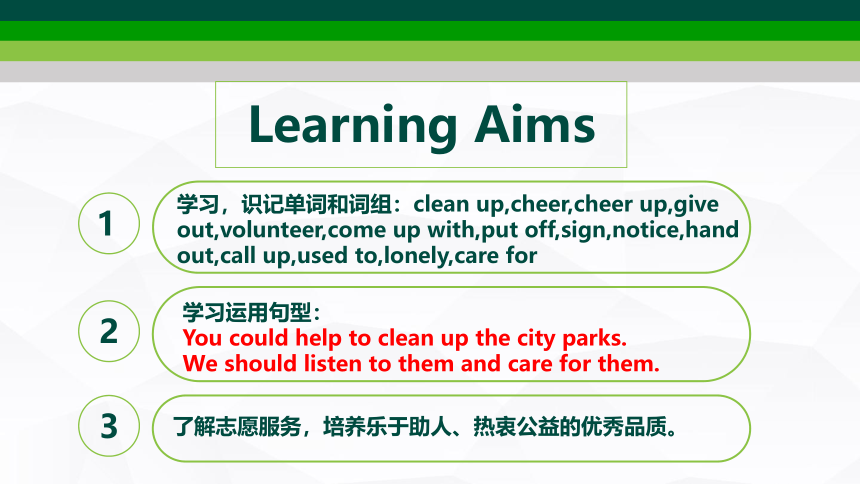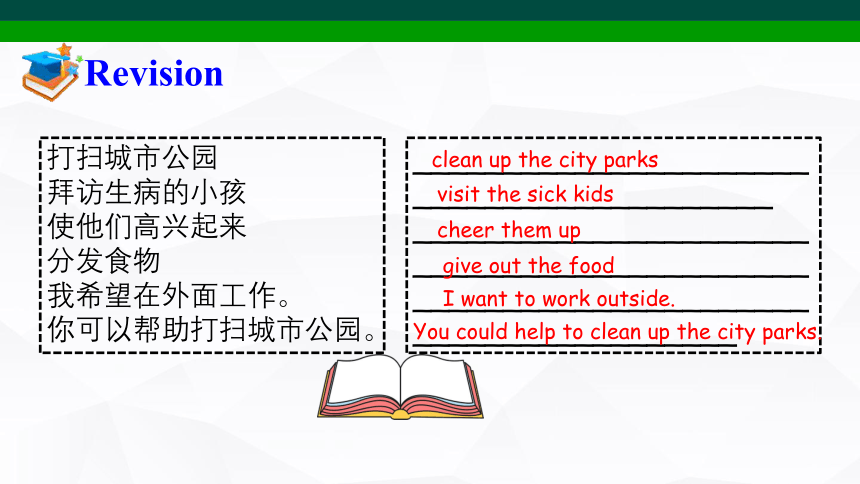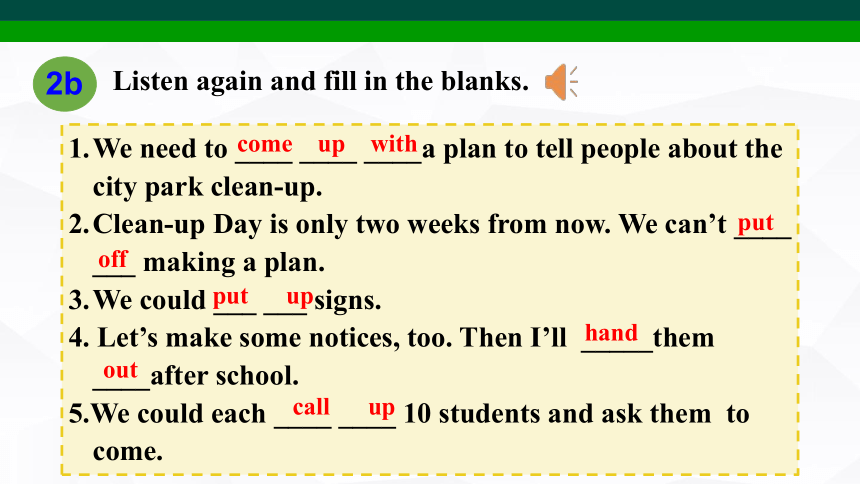八年级英语下册Unit 2 I'll help to clean up the city parks.SectionA 2a-2d 课件(共有PPT17张,含音频)
文档属性
| 名称 | 八年级英语下册Unit 2 I'll help to clean up the city parks.SectionA 2a-2d 课件(共有PPT17张,含音频) |  | |
| 格式 | zip | ||
| 文件大小 | 3.6MB | ||
| 资源类型 | 教案 | ||
| 版本资源 | 人教新目标(Go for it)版 | ||
| 科目 | 英语 | ||
| 更新时间 | 2022-02-12 12:34:14 | ||
图片预览







文档简介
(共17张PPT)
Section A 2a-2d
Unit2 I’ll help to clean up
the city parks.
学习,识记单词和词组:clean up,cheer,cheer up,give out,volunteer,come up with,put off,sign,notice,hand out,call up,used to,lonely,care for
学习运用句型:
You could help to clean up the city parks.
We should listen to them and care for them.
了解志愿服务,培养乐于助人、热衷公益的优秀品质。
1
2
3
Learning Aims
Revision
打扫城市公园
拜访生病的小孩
使他们高兴起来
分发食物
我希望在外面工作。
你可以帮助打扫城市公园。
__________________________________________
____________________________________________________________________________________
clean up the city parks
visit the sick kids
cheer them up
give out the food
I want to work outside.
You could help to clean up the city parks.
Warming up
put ads in the
newspapers
put ads on TV
put up signs
call up friends/classmates
hand out the
notices
2a
A group of students are planning a City Park Clean-Up Day. Listen and check (√) the things they are going to do to tell people about it.
√
√
√
2b
Listen again and fill in the blanks.
We need to ____ ____ ____a plan to tell people about the city park clean-up.
Clean-up Day is only two weeks from now. We can’t ____ ___ making a plan.
We could ___ ___ signs.
4. Let’s make some notices, too. Then I’ll _____them ____after school.
5.We could each ____ ____ 10 students and ask them to come.
come up with
put
off
put up
hand
out
call up
Boy1: Now we need to come up with a plan to tell people about the city park clean-up.
Girl1: Yeah, but I’m hungry, Bob. Let’s have lunch first.
Girl2: No, we need to start now. Clean-up Day is only two weeks from now.
Boy2: You’re right, Sally. We can’t put off making a plan. As we talk, I’ll write down all our ideas. Then we can decide which ideas are best.
Tape script
Conversation 1
Girl1:Um…well…we could put up signs.
Boy2:That’s a good idea!
Girl2:Let’s make some notices, too. Then I’ll hand them out after school.
Boy1:OK. Great! And we could each call up 10 students and at them to come.
Boy2: Hey, we’re coming up with a lot good ideas, aren’t we
Conversation 2
2c
Make a conversation using the information in 2a and 2b.
We need to come up with a plan for the City Park Clean-Up Day.
Let’s have lunch first.
No, we need to start now. Clean-Up Day is only two weeks from now.
Pair work
How could we help with the following things:
old people: lonely; weak
blind kids: want to learn Chinese
sick animals: got hurt
terrible environment: dirty river; air pollution
We could/should…
We need to…
Let’s…
We’d like to …
2d
Role play the conversation.
Helen: Hi, Tom. I’m making some plans to work in an old people’s home this summer.
Tom: Really I did that last summer!
Helen: Oh, what did they ask you to help out with
Tom: Mmm… things like reading the newspaper to the old people,or just talking to them. They told me stories about the past and how things used to be.
Helen: That sounds interesting.
Tom: Yeah, a lot of old people are lonely.We should listen to them and care for them.
Helen: You’re right. I mean, we’re all going to be old one day, too.
海伦:嗨,汤姆!我正在制定一些今年夏天去一家老人之家工作的计划。
汤姆:真的吗?去年夏天我做过的!
海伦:哦,他们让你帮助做些什么?
汤姆:嗯.....像给老年人读报纸,或者只和他们聊天这样的事。他们给我讲关于过去的故事,并告诉我过去事情是什么样子的。
海伦:那听起来挺有趣的。
汤姆:是的,很多老年人都很孤独。我们应该倾听他们说话并且照顾他们。
海伦:你是对的。我的意思是,我们所有人终有一天也会变老的。
Q1: Who plans to work in the old people’s home
Q2: What did the old people ask Tom to help out with
Q3: What did Tom learn from the old people
Q4: How are the old people and what should we do
for them
Helen.
Things like reading the newspaper to the old people, or just talking to them.
He learned stories about the past and how things used to be.
They are lonely. And we should listen to them and care for them.
Listen to the tape and answer the questions.
Language points
1. I hope to work outside. 我希望在室外工作。
hope to do sth. “希望做某事”,动词不定式做 hope 的宾语。
2. You could help to clean up the city parks.
你可以帮忙清洁城市公园。
情态动词could 表示给出建议,此时could并不
表示过去,而是表示一种更委婉的语气,意为“可以”。
3.come up with 想出;提出(主意、计划、回答等)
通常用于想出主意、计划、回答等,相当于think up。
动词+up with 短语:
catch up with 赶上;追上 keep up with 跟上;紧跟
put up with 容忍;忍受 end up with 以为...结束
4.put off 推迟
指会议、活动等未能按照预定的时间举行。 put off后可跟名词、代词或动词-ing形式做宾语。
put 构成的常见短语:
put away 收起来 put on 穿上;表演
put out 扑灭;熄灭 put in 提出;提交
put down 记下;放下 put up 举起;张贴;搭建
Language points
Language points
5.They told me stories about the past and how things used to be.
used to后跟动词原形,表示“过去常常做某事”.
“used to +动词原形”的各种句式:
(1)肯定句:主语+used to+动词原形+其他.
他们过去住在北京。They used to live in Beijing.
(2)否定句:“主语+didn’t use to +动词原形+其他.”或“主语+ usedn’t to + 动词原形+其他.”,在口语中常用“didn’t use to”。
我过去不留长发。I didn’t use to have long hair.
I usedn’t to have long hair.
6.We should listen to them and care for them.
care for 表示“照顾;照料”,相当于 take care of 或
look after。
孩子们在幼儿园被照顾得很好。
The children are well cared for in the kindergarten.
The children are taken good care of in the kindergarten.
7.The boy could give out food at the food bank.
give out意为“分发;发放”,相当于hand out,它们都是“动
词+副词”结构的短语。
【拓展】
give out还可表示“发出(光、热、声音、气味等)”
Volunteering
will make your life colorful.
No matter how little the power is,
everyone can make a difference!
Thanks for your watching!
Thank you
Section A 2a-2d
Unit2 I’ll help to clean up
the city parks.
学习,识记单词和词组:clean up,cheer,cheer up,give out,volunteer,come up with,put off,sign,notice,hand out,call up,used to,lonely,care for
学习运用句型:
You could help to clean up the city parks.
We should listen to them and care for them.
了解志愿服务,培养乐于助人、热衷公益的优秀品质。
1
2
3
Learning Aims
Revision
打扫城市公园
拜访生病的小孩
使他们高兴起来
分发食物
我希望在外面工作。
你可以帮助打扫城市公园。
__________________________________________
____________________________________________________________________________________
clean up the city parks
visit the sick kids
cheer them up
give out the food
I want to work outside.
You could help to clean up the city parks.
Warming up
put ads in the
newspapers
put ads on TV
put up signs
call up friends/classmates
hand out the
notices
2a
A group of students are planning a City Park Clean-Up Day. Listen and check (√) the things they are going to do to tell people about it.
√
√
√
2b
Listen again and fill in the blanks.
We need to ____ ____ ____a plan to tell people about the city park clean-up.
Clean-up Day is only two weeks from now. We can’t ____ ___ making a plan.
We could ___ ___ signs.
4. Let’s make some notices, too. Then I’ll _____them ____after school.
5.We could each ____ ____ 10 students and ask them to come.
come up with
put
off
put up
hand
out
call up
Boy1: Now we need to come up with a plan to tell people about the city park clean-up.
Girl1: Yeah, but I’m hungry, Bob. Let’s have lunch first.
Girl2: No, we need to start now. Clean-up Day is only two weeks from now.
Boy2: You’re right, Sally. We can’t put off making a plan. As we talk, I’ll write down all our ideas. Then we can decide which ideas are best.
Tape script
Conversation 1
Girl1:Um…well…we could put up signs.
Boy2:That’s a good idea!
Girl2:Let’s make some notices, too. Then I’ll hand them out after school.
Boy1:OK. Great! And we could each call up 10 students and at them to come.
Boy2: Hey, we’re coming up with a lot good ideas, aren’t we
Conversation 2
2c
Make a conversation using the information in 2a and 2b.
We need to come up with a plan for the City Park Clean-Up Day.
Let’s have lunch first.
No, we need to start now. Clean-Up Day is only two weeks from now.
Pair work
How could we help with the following things:
old people: lonely; weak
blind kids: want to learn Chinese
sick animals: got hurt
terrible environment: dirty river; air pollution
We could/should…
We need to…
Let’s…
We’d like to …
2d
Role play the conversation.
Helen: Hi, Tom. I’m making some plans to work in an old people’s home this summer.
Tom: Really I did that last summer!
Helen: Oh, what did they ask you to help out with
Tom: Mmm… things like reading the newspaper to the old people,or just talking to them. They told me stories about the past and how things used to be.
Helen: That sounds interesting.
Tom: Yeah, a lot of old people are lonely.We should listen to them and care for them.
Helen: You’re right. I mean, we’re all going to be old one day, too.
海伦:嗨,汤姆!我正在制定一些今年夏天去一家老人之家工作的计划。
汤姆:真的吗?去年夏天我做过的!
海伦:哦,他们让你帮助做些什么?
汤姆:嗯.....像给老年人读报纸,或者只和他们聊天这样的事。他们给我讲关于过去的故事,并告诉我过去事情是什么样子的。
海伦:那听起来挺有趣的。
汤姆:是的,很多老年人都很孤独。我们应该倾听他们说话并且照顾他们。
海伦:你是对的。我的意思是,我们所有人终有一天也会变老的。
Q1: Who plans to work in the old people’s home
Q2: What did the old people ask Tom to help out with
Q3: What did Tom learn from the old people
Q4: How are the old people and what should we do
for them
Helen.
Things like reading the newspaper to the old people, or just talking to them.
He learned stories about the past and how things used to be.
They are lonely. And we should listen to them and care for them.
Listen to the tape and answer the questions.
Language points
1. I hope to work outside. 我希望在室外工作。
hope to do sth. “希望做某事”,动词不定式做 hope 的宾语。
2. You could help to clean up the city parks.
你可以帮忙清洁城市公园。
情态动词could 表示给出建议,此时could并不
表示过去,而是表示一种更委婉的语气,意为“可以”。
3.come up with 想出;提出(主意、计划、回答等)
通常用于想出主意、计划、回答等,相当于think up。
动词+up with 短语:
catch up with 赶上;追上 keep up with 跟上;紧跟
put up with 容忍;忍受 end up with 以为...结束
4.put off 推迟
指会议、活动等未能按照预定的时间举行。 put off后可跟名词、代词或动词-ing形式做宾语。
put 构成的常见短语:
put away 收起来 put on 穿上;表演
put out 扑灭;熄灭 put in 提出;提交
put down 记下;放下 put up 举起;张贴;搭建
Language points
Language points
5.They told me stories about the past and how things used to be.
used to后跟动词原形,表示“过去常常做某事”.
“used to +动词原形”的各种句式:
(1)肯定句:主语+used to+动词原形+其他.
他们过去住在北京。They used to live in Beijing.
(2)否定句:“主语+didn’t use to +动词原形+其他.”或“主语+ usedn’t to + 动词原形+其他.”,在口语中常用“didn’t use to”。
我过去不留长发。I didn’t use to have long hair.
I usedn’t to have long hair.
6.We should listen to them and care for them.
care for 表示“照顾;照料”,相当于 take care of 或
look after。
孩子们在幼儿园被照顾得很好。
The children are well cared for in the kindergarten.
The children are taken good care of in the kindergarten.
7.The boy could give out food at the food bank.
give out意为“分发;发放”,相当于hand out,它们都是“动
词+副词”结构的短语。
【拓展】
give out还可表示“发出(光、热、声音、气味等)”
Volunteering
will make your life colorful.
No matter how little the power is,
everyone can make a difference!
Thanks for your watching!
Thank you
同课章节目录
- Unit 1 What's the matter?
- Section A
- Section B
- Unit 2 I'll help to clean up the city parks.
- Section A
- Section B
- Unit 3 Could you please clean your room?
- Section A
- Section B
- Unit 4 Why don't you talk to your parents?
- Section A
- Section B
- Unit 5 What were you doing when the rainstorm came
- Section A
- Section B
- Review of Units 1-5
- Unit 6 An old man tried to move the mountains.
- Section A
- Section B
- Unit 7 What's the highest mountain in the world?
- Section A
- Section B
- Unit 8 Have you read Treasure Island yet?
- Section A
- Section B
- Unit 9 Have you ever been to a museum?
- Section A
- Section B
- Unit 10 I've had this bike for three years.
- Section A
- Section B
